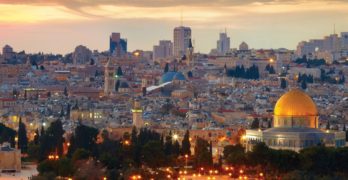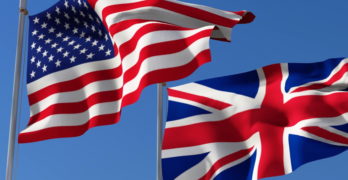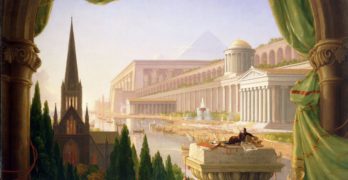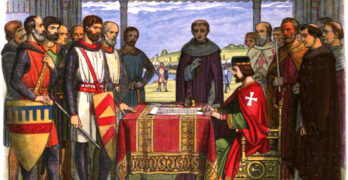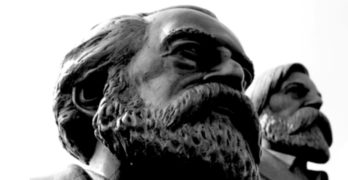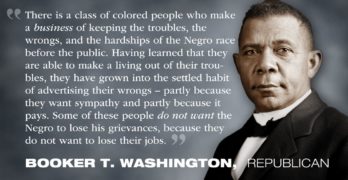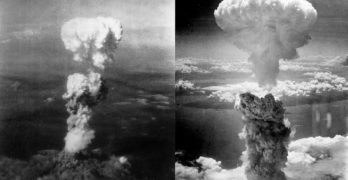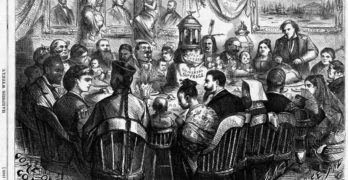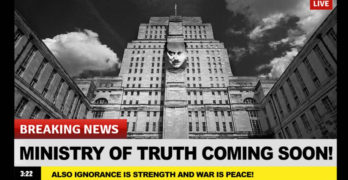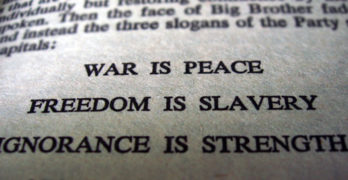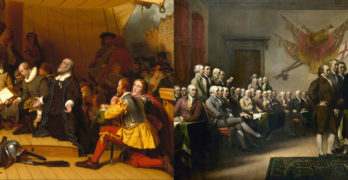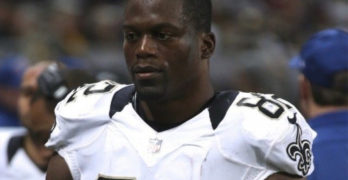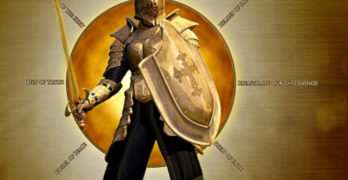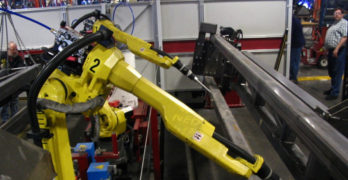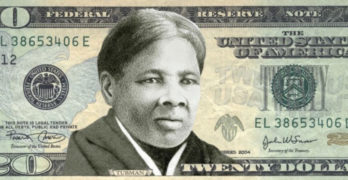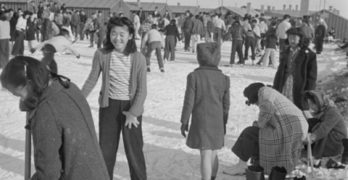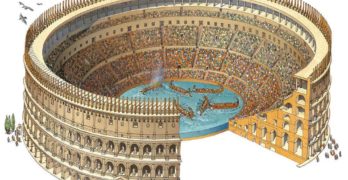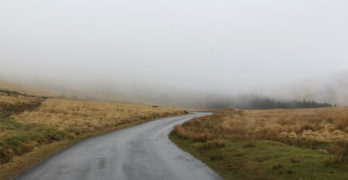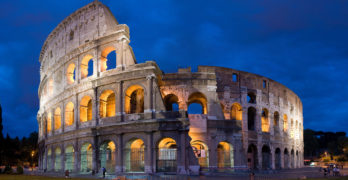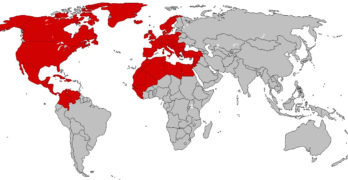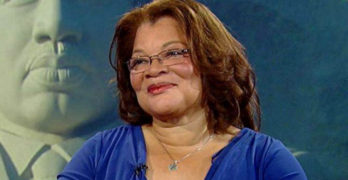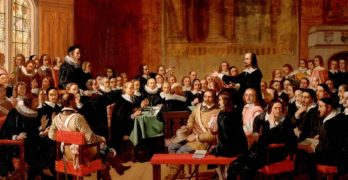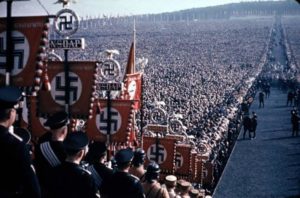 The scriptural record about the blood begins in the Garden of Eden. Then the Lord made a covering for them by shedding the blood of an innocent animal, prophesying of the atonement that Jesus would make by shedding His blood for our sins. Even if we have sinned, we have confidence into the presence of the Lord, not because of anything we can do, but because of the blood of Jesus.
The scriptural record about the blood begins in the Garden of Eden. Then the Lord made a covering for them by shedding the blood of an innocent animal, prophesying of the atonement that Jesus would make by shedding His blood for our sins. Even if we have sinned, we have confidence into the presence of the Lord, not because of anything we can do, but because of the blood of Jesus.
All our confidence is in Him, not ourselves and not even our ability to repent. His atonement not only reconciles us to God, but it also great enough to cleanse our consciences and make us pure. We are never to let our sins drive us away from the Lord, but rather to His cross until we are intimate with Him again.
The first sin committed by the first man caused the second man to kill the third. Because of envy, Adam’s eldest son killed his middle son. Envy was responsible for the first murder in history that Jesus Himself said, the blood of righteous Abel to the blood of Zechariah son of Berekiah, had been spilled…. (Matthew 23:34-35).
According to the Kings James Translation, Cain means “gotten”. Eve said I have gotten him from the Lord, whereas Abel means “breath or vapour”. God favoured Abel the younger child of the two, because he did not want anybody to think they had a natural right to His gift and inheritance. Often in Scripture we find God choosing a younger person over an older one. That sacrifice offered by the younger son, was also a prophecy that it would be the “last Adam” that would make the sacrifice acceptable to God.
Abel had learned from his parents that the only sacrifice worthy of God was a blood sacrifice- the result of a life being taken. Remember God had already covered the sin and shame of our first parents by killing animals and providing a covering from animal skins. The principle was being established that blood would be shed so that their shame could be covered which ended with Jesus Christ on the cross at Moriah which later became Calvary.
When Abel came to worship God he brought an animal sacrifice but Cain simply brought fruits and vegetables. The problem that divided them was that God accepted Abel’s sacrifice and rejected Cain’s. This was a prophecy of the enmity that would exist between those who tried to offer God their good works for acceptance, and those who would trust in the blood of Yeshua. The struggle for freedom began among the first two brothers. Jealousy led to oppression, insecurity and it has continually been the source of human conflicts.
Then came the Flood when God judged the world because of sin, after Noah had left the ark, he offered a burnt sacrifice to God:
And Noah builded an altar unto the LORD; and took of every clean beast, and of every clean fowl, and offered burnt offerings on the altar. And the LORD smelled a sweet savour; and the LORD said in his heart, I will not again curse the ground any more for man’s sake; for the imagination of man’s heart is evil from his youth; neither will I again smite any more everything living, as I have done (Genesis 8:20-21 KJV).
Then came the divine call of Abraham. Abraham was old when Isaac was born, old enough to have been his grandfather but God chose him to take his son Isaac to Mount Moriah to offer him as a sacrifice to God. The son represented everything sacred to his father’s heart: the promises of God, the covenants and the promised Messiah. Isaac, the son of promise was to be surrendered to God only by death.
So Abraham entered into a covenant relationship with Abraham and God tested his faith which would follow the same basic plan later in history. The Bible tells us that Abraham was willing to kill Isaac as a sacrifice because he believed God would raise him from the dead after he had killed him. Remember Isaac said to Abraham, My father! And he said, here I am, my son. Isaac said, See, here are the fire and the wood, but where is the lamb for the burnt sacrifice? Abraham said, My son, God Himself will provide a lamb for the burnt offering….. (Genesis 22:7-8).
Here Abraham spoke prophetically, and referred to that Lamb of God which He had provided for Himself, Who in the fullness of time would take away the sin of the world, and of Whom Isaac was a most expressive type (Adam Clarke, The Holy Bible with a Commentary). For Abraham was a prophet (Gen. 20:7). Jesus said Abraham hoped for “My day My incarnation; and he did see it and was delighted” (John 8:56).
Most of the written and image representatives of the sacrifice of Isaac paint him as a boy of 12. However, according to the ancient historian Josephus, Isaac was perhaps 25 years old or was in his early thirties at the time of the sacrifice.
The Bible also tells us the length of Isaac’s mother Sarah was 127 years, which would make Isaac to be 37 years. This means he could have resisted easily but he submitted in faith to his father Abraham. Through the blood that was shed on Mount Moriah, the life of Isaac was spared. By that blood, he was in another sense raised again from the dead.
After a period of four hundred years, Isaac bore Jacob who later became, in Egypt the children of Israel. Then the Lord delivered the nation of Israel from Egyptian bondage. God appointed that, on the night they were to go out of Egypt, each family should kill a lamb.
Remember Jesus said that He did not come to destroy the law but to fulfill it. So you cannot understand the New Testament without the Old. That is why so many of the words in Exodus are used again in the New Testament-words such as law, covenant, blood, lamb, Passover, Exodus, leaven. These words are used in the New Testament but derive their meaning from the book of Exodus.
Another example is, six months before Jesus died on the cross He was 4,000 feet high on top of Mount Hermon in the north of Israel, talking with Moses and Elijah. Luke’s Gospel tells us that they talked about the Exodus which Jesus was about to accomplish in Jerusalem.
What is more Jesus died at 3:00 P.M., (see Luke 23:44), the very time when thousands of Passover lambs were being slaughtered. This is confirmed in the gospel of Luke chapter 22:7-20. Even the man carrying a pitcher of water that met the disciples and directed them to the Passover guest room were the meal was to be taken was foretold in the book of Deuteronomy:
You may not offer the Passover sacrifice within any of your towns which the Lord your God gives you, but at the place which the Lord your God will choose in which to make His Name [and His Presence] dwell, there you shall offer the Passover sacrifice in the evening at sunset, at the season that you came out of Egypt (Deuteronomy 16:5-7).
Christians also have a Passover meal regularly, for the Lord’s Supper is a Passover Meal, commemorating the liberation of Christ. Paul again speaks of keeping the feast and getting rid of the yeast or leaven because Christ our Passover lamb has been sacrificed.
The Old Testament Passover Lamb, which is a type of Christ, was examined for 72 defects. The true Lamb of God, our Lord Jesus Christ, was absolutely without fault. That is why Pilate said to the chief priests and to the people that I find no fault in this Man.
This lamb was to be eaten in the way that God instructed, and the blood had to be sprinkled on the door-posts, to mark the houses of the Israelites from those of the Egyptians. The angel of the Lord, when destroying the first-born of the Egyptians, would pass over the houses marked by the blood of the lamb which became the Passover (See Exodus 12:12-14).
When Israel reached Sinai, the Lord gave His Law as the foundation of His covenant and that covenant had to be established in blood as the Book of Hebrews says: But into the second went the high priest alone once every year, not without blood, which he offered for himself, and for the errors of the people (Hebrews 9:7 KJV).
The blood of the sacrifice was sprinkled on the altar, on the book, and on the people. They could not get acceptance from a holy God, in any other way except through the shedding and sprinkling of blood (See Exodus 24:6-8).
The sprinkling of the blood continued on the Day of Atonement which represented the time when the people confessed their sins as a nation, and the high priest went into the Most Holy Place to make atonement for them. Again sacrifices were made and blood was shed so that the people’s sins could be covered until Christ’s sacrifice on the cross would give us the opportunity to have our sins forgiven (See Leviticus 16: 11-19).
Throughout the Old Testament, the priests sacrificed the blood of goats, bulls, and turtle doves but all these could never wash away sin on a permanent basis, but merely temporarily cover sin. This same ritual had to be repeated every year until our Lord Jesus Christ’s death replaced this system once and made an end of all shadows by opening the way to the Father in fellowship with Him in spirit and truth.
Jesus fulfilled all Old Testament prophecies of the Messiah: He was born of a virgin, in Bethlehem, in the line of Abraham and David; He was rejected by His own people; His hands, feet and side were pierced, but no bones were broken; and He rose from the dead and ascended into heaven. He said, “I am the way and the truth and the life. No one comes to the Father except through Me. If you know Me, you will also know My Father. … The one who has seen Me has seen the Father” (John 14:6-8). He also said, “I tell you the truth, before Abraham was born, I am” (John 8:58).
Here, Jesus claimed not only to have pre-existed Abraham but also that His pre-existence was eternal, as would have been the case had He said, “I was.” More significantly, “I AM” was a name for God. He further identified himself as the God of the Old Testament when proclaiming, “I am the light of the world” (Psalm 27:1 says, “The Lord is my light and my salvation”) and “I am the good shepherd.”(Psalm 23:1 says, “The Lord is my shepherd.”) When responding to the high priest as to His deity, Jesus said, “I am and you will see the Son of Man seated at the right hand of the Power, and coming with the clouds of heaven” (Mark 14:62).
A True Story – The Blood of Yeshua makes the Difference
An Indian evangelist named Sadhu Chellappa was on a mission trip to a village north of Madras, when in the middle of the night he suddenly sensed God speaking to him: Leave this house quickly and run away! Not exactly a convenient thing to do.
But Chellappa was used to accepting even strange instructions from the Lord without discussion, so he dressed quickly and ran into the darkness. After a while, he was in the open country. Then as he passed beneath a large tree, he felt the Lord tell him, “Stay here and start to preach!”
Now, even for an experienced evangelist, this was puzzling-there was no one to be seen. Why did God want him to preach to an empty field in the middle of the night? But he stopped under the tree and began to preach the gospel. Finally he reached the point at which he called on his unseen listeners to give their lives to Jesus.
He was surprised to hear a voice from the top of the tree and see a man climb down crying. The man tearfully gave his life to Jesus and accepted His sacrifice. When Chellappa asked why he was in a tree out in the middle of nowhere, the man admitted, “I came out here to hang myself.”
Another story is for a young farming couple who were attending an evangelistic meeting in Durban South Africa. They had traveled 100 miles to the meeting, and at the conclusion, they climbed back into their car for their return home. They spoke very little for the first part of their journey until the wife broke the silence.
She said: “I should have gone forward tonight and given my life publicly to Jesus.” He replied, “So should I. When the evangelist read the verse about being hot or cold, that spoke to me very strongly.” She then told her husband that the very same Bible verses spoke to her. So, because you are lukewarm and neither cold nor hot, I will spew you out of My mouth! (Revelation 3:16). Apparently, both of them were waiting for the other to make the first move.
Arriving home that night, absolutely worn out, she took a bath and called out to the kitchen for her husband to make her a hot drink of chocolate. He put two cups on the bench, boiled the jug, made himself a cup of tea, and a cup of hot chocolate for his wife. Upon handing it to her in the bath, she cried out, “What an evil trick to play on me at this time of the night. This chocolate is freezing cold.”
Mystified, they left both cups, which had been filled with hot water from the same jug, and came to the very quick realization that Almighty God Himself had intervened in their lives, and that it was high time to make a firm decision for Jesus Christ.They traveled all the way back the following night, and when the invitation was given by the evangelist, once again at the conclusion of the meeting to confess Jesus Christ as personal Lord and Savior, this couple were the first two to walk down the aisle hand in hand to surrender their lives to Jesus Christ.
The challenge is clear. If God in heaven put so much value on human souls so as to send an Indian evangelist in the middle of the night for one soul who was about to commit suicide without knowing his Savior; and to reveal Himself supernaturally to two people living in the farthest end of South Africa, you can be sure that He knows your address as well.


